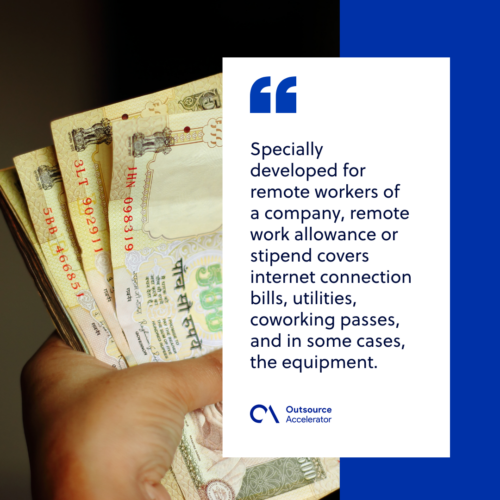Should businesses provide remote work allowance?

Employees are the backbone of every business. Without them, there would be no one working the tills, no one manning the desk, and fewer opportunities. They’re so important that some companies incentivize workers just for being there.
Signing bonuses, perfect attendance incentives, and retention bonuses are just some of the words that employers throw around to get their employees’ attention.
Now, as many companies have been switching to the remote work setup, there is one burning question: should they provide remote work allowance?
The remote work trend
In 2020, when the pandemic hit, the world changed — companies around the world implemented remote working as a fallback.
Office dwellers had to leave their desks and exchange them for home offices and DIY desks. They became remote employees in a blink of an eye.
Amid the troubling times, employers wanted to keep everyone’s morale up despite the circumstances. And then it clicked: remote work allowance.
Remote work allowance has always been the norm for remote-first companies but it bled through traditional working places.
Defining remote work allowance
Specially developed for remote workers of a company, remote work allowance or stipend covers internet connection bills, utilities, coworking passes, and in some cases, the equipment.
Given to staff who work outside of the office, it serves as a safety net so they don’t worry about extra bill charges brought on by remote working.
Any stipend is given on top of the basic salary. There are cases wherein allowances are packaged together and given at a timely interval, usually per salary cutoff.

Advantages of remote work allowance
As per usual, there are certain benefits that businesses reap when they provide remote work allowance. Here are some of them.
Higher employee retention
When workers are compensated well, they will most likely stay with the company longer. They won’t feel the need to look for another job that pays better because they’re happy with what they’re getting, hence lowering employee churn rate,
Morale boosts
Receiving bonuses will be hard to match when it comes to morale boosters. Workers feel like they’re being valued, as shown by giving out allowances that can help them ease up some bills.
If employees’ needs are being met and validated, they will do their best to do their jobs right.
Enhanced productivity
Speaking of feeling valued, studies have shown that happy employees are more productive. In fact, this can be considered as an incentive for employers to give out more bonuses other than remote work allowance.
Clark Staff exemplifies the notion that a positive work environment fosters productivity and loyalty.
More than giving enough incentives to their remote teams, they cultivate a culture where individuals thrive, resulting in heightened morale and enhanced performance across the board.

Who can get a remote work allowance?
Allowances are given at the discretion of the employer, and not all companies have these planned in their budget. Third-party companies like Remote Employee can help businesses delegate these allowances and figure out the best possible plan for them. However, as discussed above, providing a remote work allowance may be a worthy investment to keep remote staff motivated.
Regular office workers on a remote or hybrid setup can receive remote work allowance on periods they work out of the office. Full-time and part-time remote workers can be eligible to get this incentive from their employers.
Can freelancers and contractors get a remote work allowance?
These workers are considered outsourced staff rather than traditional employees. They work and operate out of their own homes and offices, which lessens the overhead expenses of their employer.
While they aren’t a traditional worker, they can still be eligible for any kind of allowances if agreed upon by the employer.
Should remote work allowances be mandatory?
Any incentives out of the basic salary package (attendance bonus and incentive, commissions, etc.) are given at the discretion of the company’s management. That said, it can be mandatory depending on how local government units (LGUs) handle wage regulations.
At the end of the day, these governing bodies can give out (and take away) these incentives if deemed necessary.







 Independent
Independent




